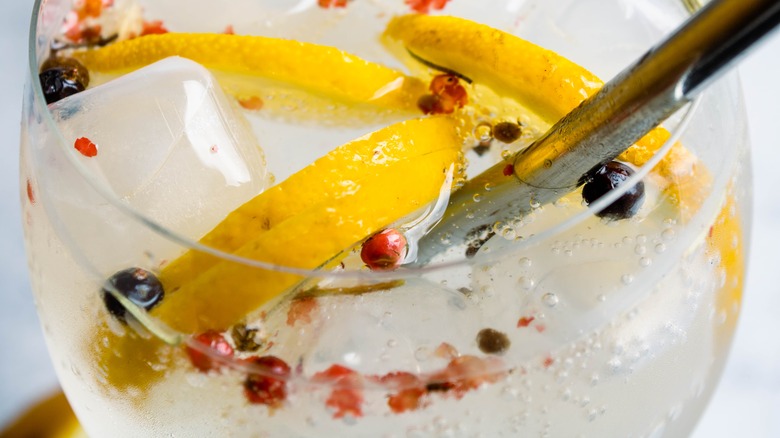The Unique Science Behind Store-Bought Mocktails
Drinking is on the decline. According to World Finance, members of Gen Z are drinking 20% less than their Millennial counterparts, who in turn consume less alcohol than Gen X and the preceding Baby Boomers. The main factor driving this trend has been concern over the health effects of alcohol. This has sent waves of panic through the alcohol industry, but it's also opened up a new market for mocktails. Even as more people steer clear of alcohol, drinking remains deeply ingrained in social life, and those who choose not to drink often find themselves at odds with parties and other communal settings. It turns out, many of today's teetotalers want to drink, just not get drunk — but meeting this demand is more challenging than you might think.
Making your own mocktails at home can be quite easy, but creating shelf-stable versions you can buy in stores is a much trickier feat. You might think companies could just make regular cocktails minus the alcohol, but it's not that simple — thanks to a pesky little thing called chemistry. Alcohol has unique chemical properties that affect the way it tastes, feels, and interacts with other ingredients. You can't just swap the gin in a cocktail for water, since water won't absorb the same ingredients alcohol can. On top of that, there's the challenge of replicating alcohol's unique fiery flavor. It's all quite complex, but a slew of young companies have stepped up to meet this challenge with innovative technology.
Replicating alcohol's unique chemical properties
The alcohol in spirits is technically ethanol (C2H5OH), and it behaves very differently from good old H2O. Ethanol attracts many things that cannot dissolve in water, so cocktails can incorporate flavors like cinnamon, cocoa, and vanilla. Suppose you're going to make a mocktail with ingredients that can't dissolve in water. In that case, you're going to need science on your side, and mocktail brands have had to experiment in order to come up with a number of pretty impressive solutions.
Consider London-based Lyre's, a mocktail maker that caters to the Middle East market, where many nations have laws limiting beverages to 0.05% alcohol. To infuse their boozeless beverages with a variety of flavorings, Lyre's uses nanoemulsion technology. Emulsions are mixtures of two substances that cannot form a solution, wherein one substance is dispersed throughout another in tiny droplets. In nanoemulsions, those droplets are each less than 200 nanometers wide, sometimes falling below 100, which is so minute that our tongues cannot sense a difference in texture. This way, Lyre's can infuse flavorings like vanilla and nuts into their American Malt, an incredible replica of dark liquor.
Then there's the Chicago-based brand Ritual Zero Proof, which creates non-alcoholic alternatives to gin, rum, whiskey, tequila, and aperitifs. They use botanical distillates to mimic the flavors of various spirits. For example, their tequila alternative uses blue agave distillate. Water-based plant distillates are known as hydrosols, and they are sort of like drinkable essential oils. They are perfect for mocktail creators, but some flavors are more challenging to replicate than others, which brings us to the taste of ethanol itself.
Feeling the burn
Some mocktail makers have managed to mimic the taste of alcohol without alcohol. The burning sensation associated with alcohol is known as a trigeminal sensation because rather than affecting our taste buds, the beverage affects the trigeminal nerve in the face and mouth. This triggers a pain response, and it's the key to replicating the taste of alcohol. In order to do this, mocktail makers turn to another ingredient that triggers trigeminal sensations: Spicy foods. Chile peppers, black pepper, Szechuan peppercorns, and ginger can all be used to mimic that burning sensation.
While many mocktails seek to mimic the taste of alcohol, other brands are taking a different route, devising wholly original "spirits" that contain no alcohol to begin with. That's where hydrosols come into play. Look at the English brand Pentire, whose products eschew traditional alcoholic flavors in favor of a ground-up approach. Their products are based on distillates made with plants endemic to the English coast, such as rock samphire, sea buckthorn, and woodruff. French brand Alavie has even created sparkling drinks based on plant distillates that are conceptually similar to champagne, yet wholly unique in flavor. It's a riskier route than replicating the tried-and-true flavors of alcohol, but for adventurous drinkers, it's equally, if not more, rewarding.


